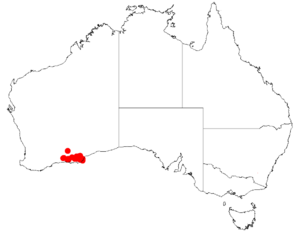Acacia bracteolata facts for kids
Quick facts for kids Acacia bracteolata |
|
|---|---|
| Scientific classification | |
| Genus: |
Acacia
|
| Species: |
bracteolata
|
 |
|
| Occurrence data from AVH | |
Acacia bracteolata is a type of shrub that belongs to the Acacia family. It is found only in Western Australia, meaning it is endemic to that area.
Meet the Acacia bracteolata
This spreading shrub usually grows to be about 0.3 to 0.7 metres (1 to 2 ft) tall. Its small branches are covered in fine hairs. It has tiny leaf-like parts called stipules that are about 3 to 4 mm (0.12 to 0.16 in) long.
What it Looks Like
Instead of true leaves, this plant has special flattened stems called phyllodes. These phyllodes are not perfectly even on both sides. They are shaped like a narrow oval or a spoon. Each one measures about 15 to 25 mm (0.59 to 0.98 in) long and 5 to 10 mm (0.20 to 0.39 in) wide.
The Acacia bracteolata blooms in August. It produces bright yellow flowers. The flowers grow in small, round or oval-shaped clusters. These clusters are about 4.5 to 5.5 mm (0.18 to 0.22 in) wide. Each cluster holds between 19 and 25 lemon-yellow flowers.
After the flowers, seed pods begin to form. These pods are shaped like a bow. They can grow up to 6 cm (2.4 in) long and 6 to 7 mm (0.24 to 0.28 in) wide. Inside the pods are dull black seeds. These seeds are shaped like a long oval and are about 4 mm (0.16 in) in length.
Where it Grows
This shrub is native to the Goldfields-Esperance region of Western Australia. You can find it growing east of Esperance. It prefers sandy soils that contain granite.
The Acacia bracteolata grows from around Grass Patch in the north. It stretches down to Cape Arid National Park in the south. It is often found in areas with other shrubs or low-growing mallee trees.

